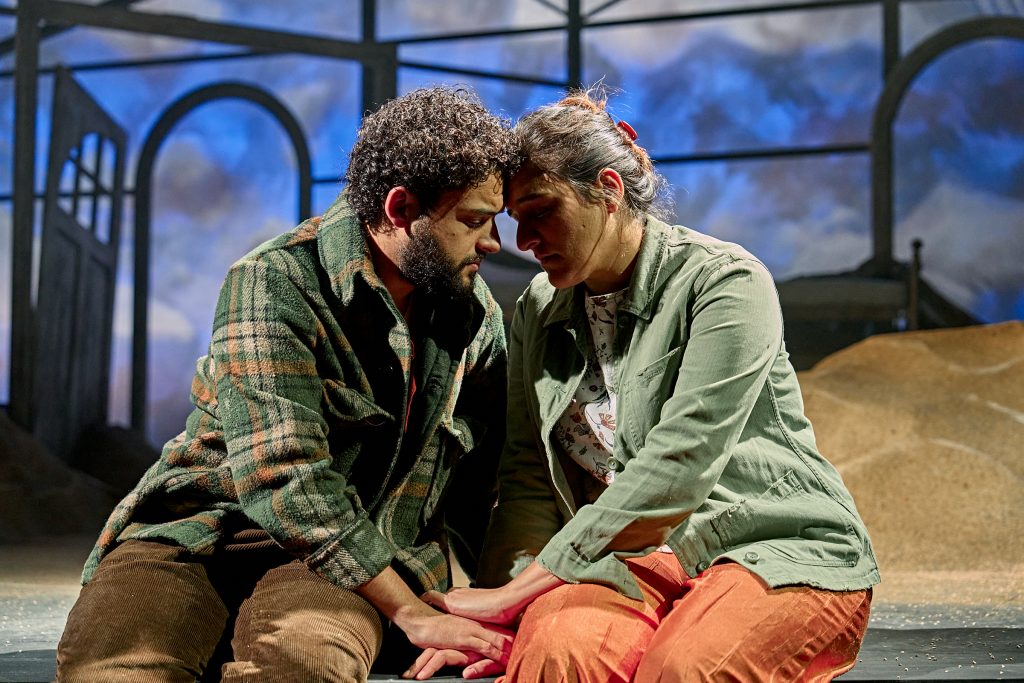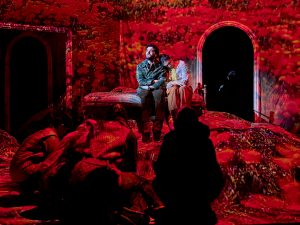
An enticing performance that kept you on the edge of your seat, wanting to know what happened next for the family, The Beekeeper of Aleppo, based on Christy Lefteri’s book, is an amazing way to tell the struggles of a refugee.
The play is about a family that begins in the beautiful Syrian city of Aleppo, where Nuri (played by Alfred Clay) is a beekeeper and his wife Afra (played by Roxy Faridany) is an artist.
However, when the war begins, the family is forced to flee the city. The terrifying journey of the family to seek asylum is depicted in this play.
The play is based on the Christy Lefteri novel, who got the inspiration from working as a volunteer at a women and children refugee centre in Athens between 2016 and 2017.
Christy Lefteri said: “My parents were also refugees after the war in Cyprus in 1974, so seeing what people were going through really affected me. I heard many stories. This all inspired me to start writing.”
The playwrights Matthew Spangler and Nesrin Alrefaai adapted the book into a play, and Spangler, Alrefaai and Lefteri went back and forth with the script and ensured the way they had written and adapted it was perfected.
The co-playwright, Nesrin Alrefaai, was also a refugee in Syria, so she wanted to capture the experience perfectly.
Christy also said that the duo “always asked me if I wanted to add or change anything. “I remember discussing the ending quite a lot.”
At first glance, the set appeared plain and uninteresting; however, as the play progressed, it became clear why the set was laid out in this manner.
It was incredible how the basic set could actually be transformed into something far more, where you experienced the bed being transformed into the boat on which they traveled.
This made me feel as if it was demonstrating that home is much more than a physical location; it is a feeling. This is demonstrated by the use of simple household objects such as a bed or an armchair to make you feel a part of the character’s journey as it is transformed into something else.

The show’s back and forth between Nuri and Afra’s past and present kept the audience interested because they wanted to know how they got to where they were and what happened along the way.
Going back and forth between past and present tense made it more emotional because it shows that everyone has a story about their journey and made the audience feel connected to the characters by making them feel for Nuri’s and Afra’s journey.
The music and lighting also played an important role in this production; the colour of the lighting could tell the audience a lot about what was going to happen or how they wanted the audience to feel, for example, when flashbacks of Aleppo before the war occurred, everything was bright, depicting the heavenly feel of the city.
When the performance was depicting Nuri’s terrifying personal experiences, the lighting would change to darker colours with a lot of shadowing to instill fear in the audience.
The music ranged from beautiful and traditional Mediterranean music to occasionally move the scene along, creating a sense of emotion for the characters as it displayed their cultural heritage and the hope they had of safely seeking asylum.
The actors’ performance in the play was incredible; some actors had to portray multiple characters and it was done seamlessly, from changing the way they spoke to changing their body language and costume.
Even though the main characters Nuri and Afra did not change characters, they portray how Nuri and Afra changed and grew as people while dealing with the traumatic events that have occurred to them.
This performance is an emotional roller coaster that will leave most people with tears in their eyes as it tells the story of a terrifying journey that refugees must take in order to be safe again, as well as the lengthy process that they must follow in order to find safety.
It is eye-opening because it transports you to the characters’ journey. The old saying, “Where there are bees, there is life” was one of the play’s most memorable lines.
This demonstrates the characters’ determination and hopes to find a home as remarkable as Syria was to them.
Whether you are familiar with the book or have never read it, this play is a must-see; it takes you on a journey with the characters and removes any ignorance you may have about the subject, allowing you to better understand it.
The Beekeeper of Aleppo is at the Lowry until the 22nd April and you can buy tickets below.
The Beekeeper of Aleppo | What’s On | The Lowry















Recent Comments